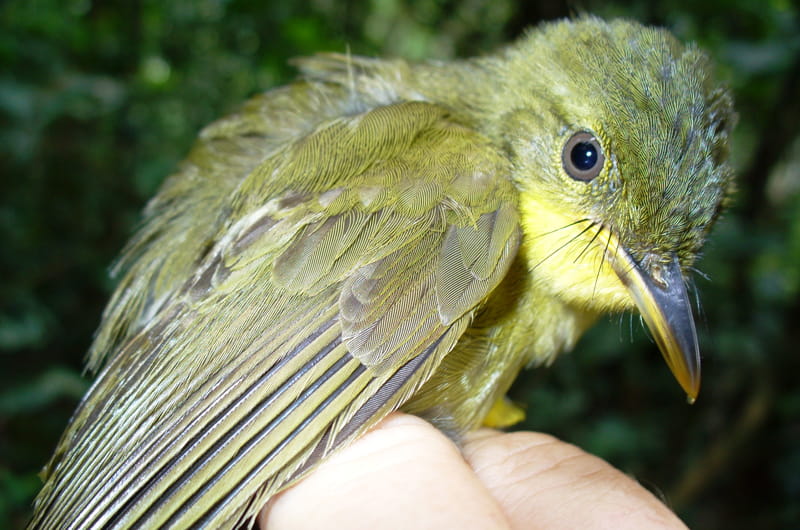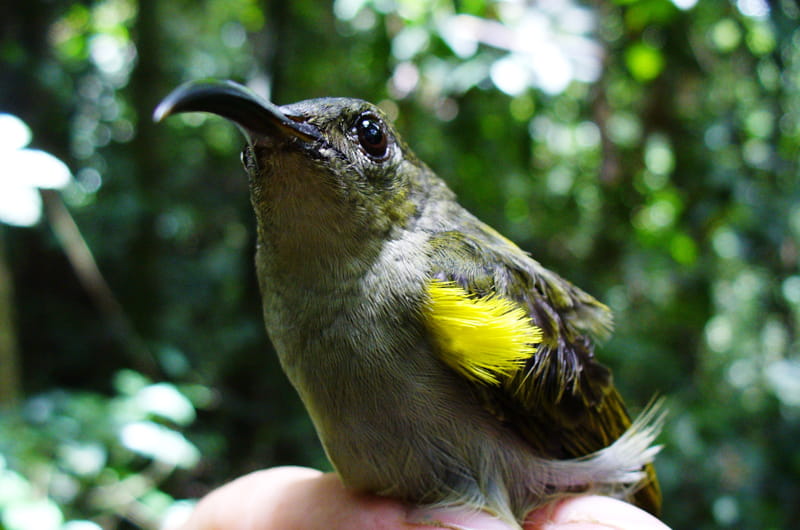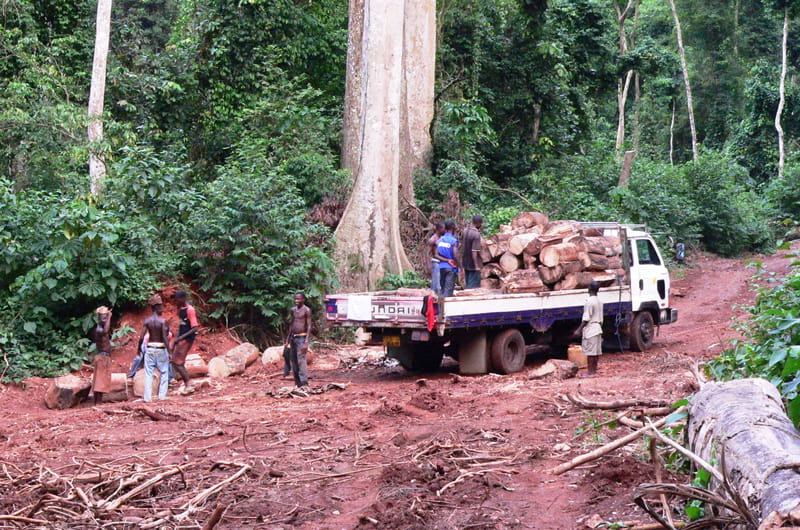As Demand for African Timber Soars, Birds Pay the Ultimate Price

- MXene Nanomaterials Enter a New Dimension
- From Drexel to the Olympics: The Legacy of Thailand’s First Winter Olympian
- Drexel-Study-Finds-Early-Intervention-Helps-Most-Autistic-Children-Acquire-Spoken-Language
- A Nanomaterial Flex — MXene Electrodes Help OLED Display Technology Shine, While Bending and Stretching

Tropical forests are home to more of the world’s terrestrial biodiversity than any other habitat but are increasingly threatened by the impact of human activities. Illegal logging, in particular, poses a severe and increasing threat to tropical forests worldwide. But, until now, its impact on tropical wildlife has not been quantified.
A new study co-authored by scientists at Drexel University, published in the most recent issue of Biological Conservation, reveals the devastating impact of illegal logging on bird communities in the understory layer of Ghana’s Upper Guinea rain forests, one of the world's 25 “biodiversity hotspots” where the most biologically rich ecosystems are most threatened.
Researchers found that the level of legal and illegal logging increased more than 600 percent between 1995 and 2010 – six times greater than the maximum sustainable rate. They also discovered that the abundance of forest understory bird species declined more than 50 percent during the same period. Species richness, or the number of different understory bird species represented, also showed declining trends. The bird communities showed no evidence of post-logging recovery.
“The numbers don’t lie and they don’t have a political agenda. These numbers are shocking,” said lead author Nicole Arcilla, PhD, postdoctoral research associate in the Biodiversity, Earth & Environmental Sciences (BEES) Department in Drexel’s College of Arts and Sciences. “Our most disturbing finding was that more than half of all understory birds had vanished in only 15 years."
"If things continue as they are, in a few decades, these incredibly beautiful forests and their unique wildlife will be largely depleted, which would be a huge loss to Ghana, Africa and the world," said Arcilla.

The Wild West
Arcilla, who spent nearly two years in Ghana netting and identifying birds as part of her field research, went to West Africa to study the effects of legal logging, but found that illegal logging was so rampant it could not be ignored.
In contrast to legal logging operations, which are undertaken by companies who apply for a government permit to log under certain parameters including restrictions on the number, size and species of trees that can be logged, illegal logging is much more devastating because it is completely unregulated. “It’s like the Wild West,” said Arcilla.
A major driver contributing to tropical forest destruction worldwide, illegal logging accounts for 50-90 percent of timber harvested in many tropical countries, according to the report. Recent studies have shown that an estimated 80 percent of timber harvested in Ghana is illegal.
If illegal logging is so widespread, why hasn’t anyone else published research on its impact on tropical wildlife?
“No one has looked at this issue in the past, to my knowledge, because illegal logging is an underworld issue, so it’s not on the books, making it much harder to quantify” Arcilla said. “But it’s so prevalent that if we don’t look at it, these forests will be destroyed. The first step in doing something about it is knowing about it.”

A Bird in the Hand
The researchers sampled bird communities in logged and unlogged forests in Ghana from 2008-2010, and compared their data with findings from fieldwork in the same study area in Ghana from 1993-1995, when illegal logging was not as prevalent.
The evidence revealed severe declines in Ghana’s Upper Guinea forest understory bird communities during the 15-year period between the two datasets. Abundance declines appear to be pervasive across the understory bird community and to be driving declines in species richness over time. Species such as the yellow-whiskered greenbul declined by 73 percent, and the icterine greenbul declined by 90 percent.
Results further indicate that Ghana’s forestry management system has seriously deteriorated due to widespread increases in logging intensity coupled with extensive illegal logging, which has decreased or eliminated post-logging forest recovery. The absence of many conservation priority species from 2008 to 2010 field data suggests continuing population declines and increasing rarity of species at risk of extinction.
“Logging and associated disturbances that have been taking place in Ghana’s forests appear to have affected the entire bird community — including both common and rare or specialized species — causing abundance declines across species,” said Arcilla. “Species that were already rare are then most vulnerable to local extinction following logging, and many ‘common’ species have become much less common."
According to the report, these severe declines in Upper Guinea forest understory birds indicate the rapidly deteriorating conservation status of a biodiversity hotspot and could signal collapsing ecosystem processes.

The Canary in the Coal Mine
“Illegal logging is having serious impacts – not just on the forests themselves – but on the animals,” said Arcilla. “It’s reasonable to assume that if the birds are being this powerfully impacted, it’s impacting other groups, such as mammals, reptiles, amphibians and arthropods. Birds – like the ‘canary in a coal mine’ – are a great indicator of what’s happening to other animals, and eventually, what will happen to us.”
The situation, though dire, is not hopeless, according to the researchers.
“There is enormous potential for regenerating logged forests for bird conservation,” the report states. For this conservation potential to be realized, according to the researchers, urgent measures must be taken to protect these surviving forest fragments and prevent further forest bird declines. Such actions would ideally include increasing forest ranger patrols, increasing forest law enforcement and increasing implementation of measures to prevent illegal logging, such as making roadblocks in logging roads following legal logging operations to prevent incursion by illegal logging operations.

“Solutions are complex and socially complicated, but the problem is solvable if there is motivation and interest,” said Arcilla.
“While increasing law enforcement and patrols in protected forests to keep forest crime down is important, the government of Ghana also needs to fundamentally reform the logging system,” Arcilla said. “Currently, most legal timber in Ghana is exported. The government needs to designate a reasonable proportion of timber for sale to its own people.”
Finally, because the levels of illegal logging documented in Ghana are typical of many tropical developing countries, the researchers believe these trends may be occurring in other tropical forest countries as well and should be investigated and addressed accordingly.
“Our view is that there is hope and that there are a lot of alternatives that haven’t been pursued,” said Arcilla. “But this situation urgently needs to be addressed and there is no time like the present."
"This can be stopped, it should be stopped and we hope it is stopped before it’s too late.”
In This Article
Contact
Drexel News is produced by
University Marketing and Communications.